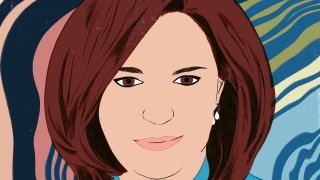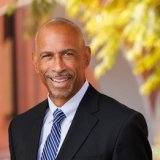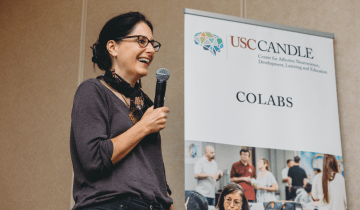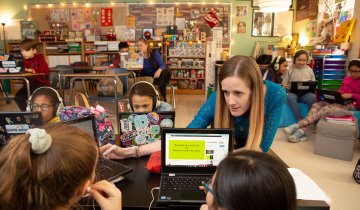In 2018 Switzerland-based Educational Consultant Elana Glasenberg EdD ’21, now a member of USC Rossier’s Board of Councilors, was observing and evaluating schools in Ukraine when she made a chilling discovery. “I asked why I never saw a disabled child in the schools we visited,” recalled Glasenberg. She learned that nearly 100,000 disabled children were institutionalized in Ukraine.
On the same trip, when parents in Kiev expressed the need for a school to house 1,000 students, Glasenberg saw an opportunity. She had traveled to Ukraine as a consultant for U21, an educational foundation based in Zurich. Upon returning to Switzerland, Glasenberg proposed that U21 support the creation of an “inclusive school,” one that would bring students with disabilities into the general population. The foundation agreed.
Drawing on her expertise in special and gifted education, Glasenberg initiated plans for a school in which young people of varied physical and cognitive abilities would learn together in a fully accessible new building. Instruction would be conducted in Russian through the London-based educational training company Inclusion Expert. In September, the inclusive school opened its doors. Funded and administered by U21, it now employs 97 teachers and serves 1,200 students in the first through 12th grades.
“Sometimes, things fall together in ways you don’t expect,” Glasenberg notes. Even before her life-altering trip to Ukraine, she had been admitted to USC Rossier’s EdD program in Organizational Change and Leadership (OCL). Her work in Ukraine became the focus of her dissertation, “Implementing Inclusive Education in Ukraine: Developing Teachers and Partnerships for Change.” She received her degree in June. “I couldn’t have done what we’ve accomplished in Ukraine without the knowledge I acquired at Rossier,” she says.
Glasenberg received her first BA in education in her native South Africa, where she met Ivan Glasenberg MBA ’83. After a long-distance courtship while Ivan attended the USC Marshall School of Business, they married in 1984. The couple moved to Australia, where she earned a BEd in special education.
Following a sojourn in Hong Kong, they settled in Switzerland, where they raised their two children. For 22 years, Glasenberg worked at the Zurich International School as a teacher, counselor, learning specialist and administrator, always focusing on students with learning challenges. Along the way, the lifelong student earned a college counseling certificate from UCLA. Most recently, her husband’s positive experience at USC Marshall led her to enroll in the OCL program.
The design and curriculum of the inclusive school reflects Glasenberg’s academic background and hands-on skills.
“Elevators, ramps, textured pathways for children who can’t see—the building is phenomenal,” she says. “Everybody in the classroom is accepted, regardless of their difficulties. If they’re in a wheelchair or have dyslexia, ADHD or autism, we are there to support all students and involve them in the learning environment.”
Today, Glasenberg is in constant contact with teachers, administrators and teacher trainers. “I keep the whole project going, but I’m not on the ground because I can’t get into Ukraine due to COVID,” she says. Looking forward, three of Glasenberg’s USC Rossier professors will attend the inclusive school’s first graduation ceremony in May 2022, and she envisions exchange programs between the two institutions.
USC Rossier also sought to continue its relationship with Glasenberg and her work. In June, she was named to the Board of Councilors. “Elana embodies the spirit of the Organizational Change and Leadership program,” Dean Pedro A. Noguera says. “She overcame entrenched prejudices to effect deeply needed change for children in Ukraine and created a model for others to follow. Her vision and expertise will be a great addition to the board.”
Glasenberg continues to consult for U21. “I’ve taken on the cause of inclusion,” she says. “This school will hopefully be a model for other countries. The situation in Lithuania, Latvia, Estonia and Moldova is the same as in Ukraine. Very little is done for children with disabilities. I hope to help develop inclusive schools and contribute something to these countries that wasn’t there before.”





